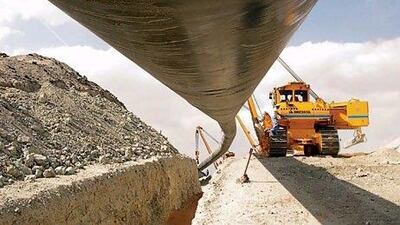The first cargo of Abu Dhabi crude to bypass the Strait of Hormuz left from Fujairah bound for Pakistan yesterday, as the pipeline connecting Abu Dhabi's onshore fields with the port on the Gulf of Oman was inaugurated.
The pipeline is "Abu Dhabi's most important midstream project", said Khadem Al Qubaisi, the managing director of the International Petroleum Investment Company (Ipic), the state-controlled fund that owns the Abu Dhabi Crude Oil Pipeline (Adcop), in a presentation at the inauguration.
With the capacity to deliver a total of 1.8 million barrels per day (bpd) of crude, Adcop will channel 1.5 million barrels of oil from Abu Dhabi's onshore fields past the Strait of Hormuz, the strategic waterway that Iran has repeatedly threatened to block.
About a fifth of global crude supply leaves the Arabian Gulf via the strait. In response to a new round of sanctions imposed on Iran by the United States and the European Union at the beginning of the year, Iran has held naval exercises near the waterway and warned that it will block the passage if the sanctions undermine its exports.
The 400-kilometre pipeline has been readied for use in recent weeks - with millions of barrels of oil pumped into the structure - bringing to an end a delay, caused by technical problems, of more than 18 months.
Adcop cost US$4.2 billion (Dh15.42bn) to complete, said Mr Al Qubaisi. Construction costs had initially been estimated at $3.3bn, but delays have added to the expense.
Ipic awarded the construction contract for the pipeline to CPECC, a subsidiary of China National Petroleum Company in 2008. In November 2010, Ipic announced the structure to be complete, but technical problems had prevented the pipeline from becoming operational until now.
The pipeline is expected to be operating at full capacity by December. By then, all three single-point mooring facilities that are used by tankers to load their cargo will be completed off Fujairah. Only one of these offshore docking stations is operating now.
The first shipment left for delivery to Pakistan Refinery, which is part-owned by Ipic.
The pipeline is a major boost to Fujairah's status as a maritime hub. The emirate's port is already a significant refuelling centre, and its status will be enhanced by Abu Dhabi's new crude export route.
Meanwhile, the head of the Abu Dhabi National Oil Company (Adnoc) confirmed that BP has not been invited to pre-qualify for the onshore concessions that are coming up for renewal in 2014.
Abdulla Nasser Al Suwaidi, Adnoc's director general, said BP had not been invited to pre-qualify for the renewal of the concessions operated by the Abu Dhabi Company for Onshore Oil Operations, which produces the vast majority of Abu Dhabi's onshore oil, which will now feed into the pipeline to Fujairah.
Mr Al Suwaidi said the British company, one of the original group of oil companies that struck oil in the emirate, may still be bidding for a stake in the new concession.

